Do you want to lose weight? Boost your brainpower? Cleanse toxins from your body? Enhance your body’s natural healing abilities? Then fasting is the best tool for you.
Fasting is the abstinence from all or some foods or drinks for a set period of time. Although popular as an essential part of deep spiritual practices, you can practice fasting for –
- Body detoxification
- Healing cellular damage
- Ketone production
- Lowering the risk of diabetes
- Preventing cancer, and
- Fast metabolism.
However, there are lots of myths surrounding fasting. Many views this practice as dangerous for health or diet fad to lose weight. But, science proves it wrong.
Read on to know the scientific effects of fasting on the body.
Fasting triggers healing
Do you know fasting can help you repair cells?
Growth hormone – IGF-1 is essential in our childhood days to grow in height and increase our body size. After a certain stage when we have reached a normal human height, we no more require this growth hormone, and the levels of IGF-1 drop naturally. If the level of this growth hormone continues to rise, it may trigger the growth of tumors and other forms of cancer. In short, a high level of growth hormone keeps our body in the growth mode instead of repair mode.
IGF-1 levels are linked to proteins from animal food or saturated food. So, if you adding a lot of seafood, milk, red or white meat to your diet, then IGF-1 levels may rise beyond the normal levels.
By ommitting animal food, you can reduce IGF-1 levels. For quick results, perform a short 3-day water fast and IGF-1 levels will rapidly drop to a normal state. With decrease in growth hormone levels, a number of repair genes are activated in our body. They function to repair any kind of cellular damage and begin to heal the body from the inside.
In the BBC documentary “Eat, Fast & Live Longer”, television journalist Michael Mosley shares his experience of fasting and its effect on growth hormone. You can watch his journey and transformation here.
Read Fasting Upto 72 Hours Can Reboot The Entire Immune System: New Study Reveals
Fasting can reduce the side effects of chemotherapy according to Valter Longo, a Gerontological researcher at The University of Southern California. He and his team found health advantages of not eating at all.
When they provided less food to the middle-aged mice for two 4-day periods each month, those mice outlived their peers by about 3 months. Also, their insulin levels were 90% lower than the control mice and they were 45% less likely to develop cancer. Despite less food, these mice were still able to retain their mental ability and beat the control animals in two kinds of memory tests.
In another study based on the mice model, short-term fasting was found to be as effective as chemotherapeutic agents in slowing down the progression of tumors. It can be concluded from the study results that fasting multiple times or say repetitive cycles promote differential stress sensitization in a range of tumors. And replace or augment the efficacy of certain chemotherapy drugs used to treat various types of cancer.
Fasting benefits brain
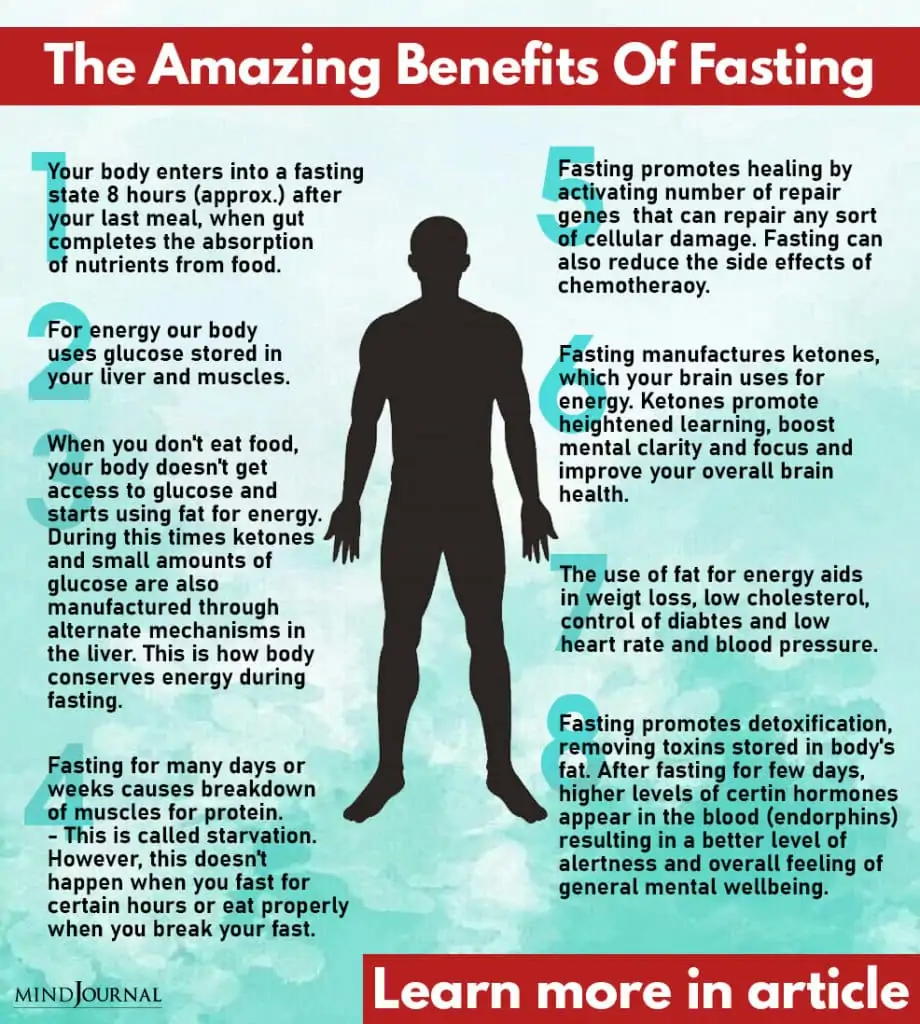
When we take food, glucose is converted to glycogen and stored in our liver in the form of fuel. Within 10-12 hours, our body consumes all the glycogen. And in absence of glycogen, our body starts burning fats to release ketones, which our brain uses for energy.
When we don’t eat food, our body doesn’t get access to glucose, forcing cells to seek an alternate source of energy. Thus, our body begins gluconeogenesis, a natural process of producing its own sugar. The liver converts lactate, amino acids, other non-carbohydrates, and fats into glucose energy and ketones. This is how our bodies conserve energy during fasting and lower our heart rate and blood pressure.
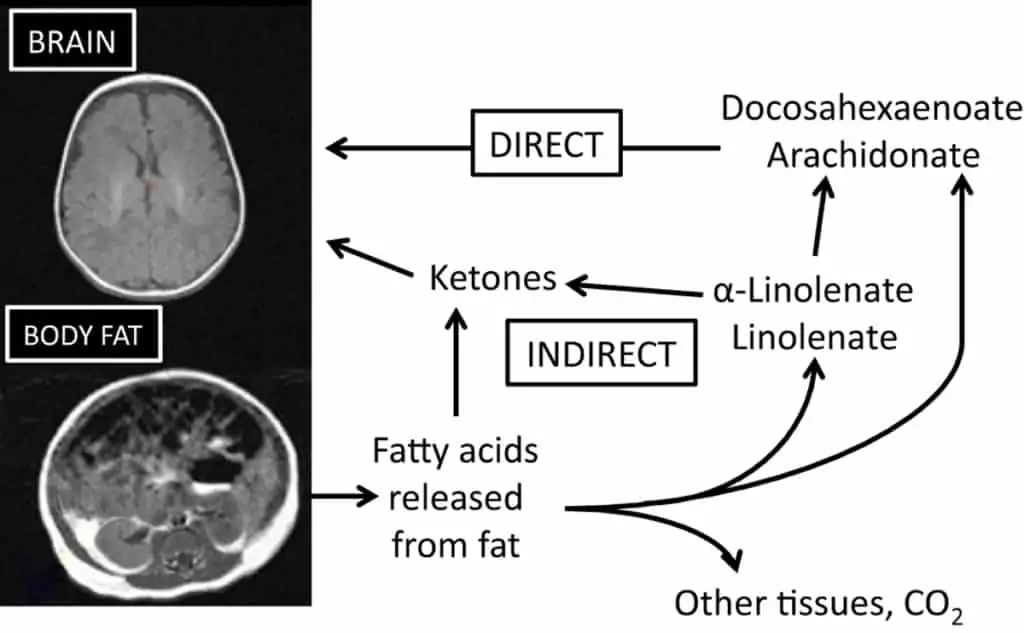
As you can see, ketones play an important role as an energy source during starvation and balances blood sugar level. Although our brain is dependent on glucose as a primary energy substrate, but is capable of utilizing ketones such as β-hydroxybutyrate (βHB) and acetoacetate (AcAc) during fasting or prolonged starvation.
Ketones shift the structure of our neural synapses to promote heightened learning. Ketones also boost mental clarity and focus and improve our overall brain health. In short, the brain feels smart on ketones.
However, if you keep taking food or undergo a very short period of starvation our bodies will not completely use glycogen in the liver and, thus, ketones aren’t produced.
There are numerous scientific benefits of intermittent fasting. According to a study by Mark Mattson, a professor of Neuroscience at the John Hopkins School of Medicine, taking calorie for two days a week can drastically improve neural connections in the hippocampus – a part of the brain associated with long and short-term memories.
Why is not eating better than restricting calories?
Here is a great video that explores the difference of when you reduce your caloric intake, versus cutting out food entirely.
Minnesota Starvation Experiment (1944) investigated the effects of calorie restriction. This project was initiated taking into consideration the sufferings of people of the ongoing World War, hoping if the experiment results can be of any aid. People starving had poor physical and psychological conditions and many suffered from cold and even desperate to eat rotten food.
According to Dr. Jason Fund, a Toronto physician – lowering the calorie intake makes it difficult to lose weight but easier to lose more lean muscle mass. Cutting calories leads to more hunger pains than starving, but soon the sensations seem to disappear.
Why?
Ghrelin is the culprit!
It’s a hunger hormone, which is responsible for feelings of hunger and weight gain. The levels of this hormone increase at times when our body is programmed to expect food like lunch or dinner.
Another Denmark based study found that Ghrelin levels decrease upon fasting for 84 hours and then hunger disappears altogether. Unlike calorie restriction, starvation pushes our bodies into the ketosis mode. At this stage, our body uses fat for energy instead of glucose.
Our body metabolism doesn’t shift to ketosis during calorie restriction and this is why the study participants in the Minnesota experiment felt very tired and hungry. With low calories in the body, insulin levels drop, metabolism slows down making you feel sluggish and hungry. On the other hand dry fasting speeds up metabolism allowing you to maintain a normal level of energy in your body.
When we eat food our body invests a lot of energy into digesting the food and converting into nutrients that can act as fuel for our system. Eating heavy food like meat, requires more energy to digest and form energy.
Not eating food saves energy and time needed to digest food, which can be utilised for other activities like cellular repair, fighting off diseases, converting fat into energy and so on.
What are the different approaches to fasting?
For some people fasting as easy as ABC, but some are shit scared. All those who have been practicing diet restrictions for many years say it’s an amazing method.
If you want to start this eating practise but finding it difficult, then you may try one of the following fasting methods recommended by Mark Mattson. Give it a try and you will find it easy to fast.
5:2 diet
- Limits your caloric intake to 500 calories, two days a week.
Instead of a regular 2000 calories a day, 5:2 diet allows you to eat only 1000 calories a week With such substantial reduction of calorie intake, your body reaches ketosis This method is far more effective than splitting the calorie intake such as 145 calories a day, which triggers much more hunger pains.
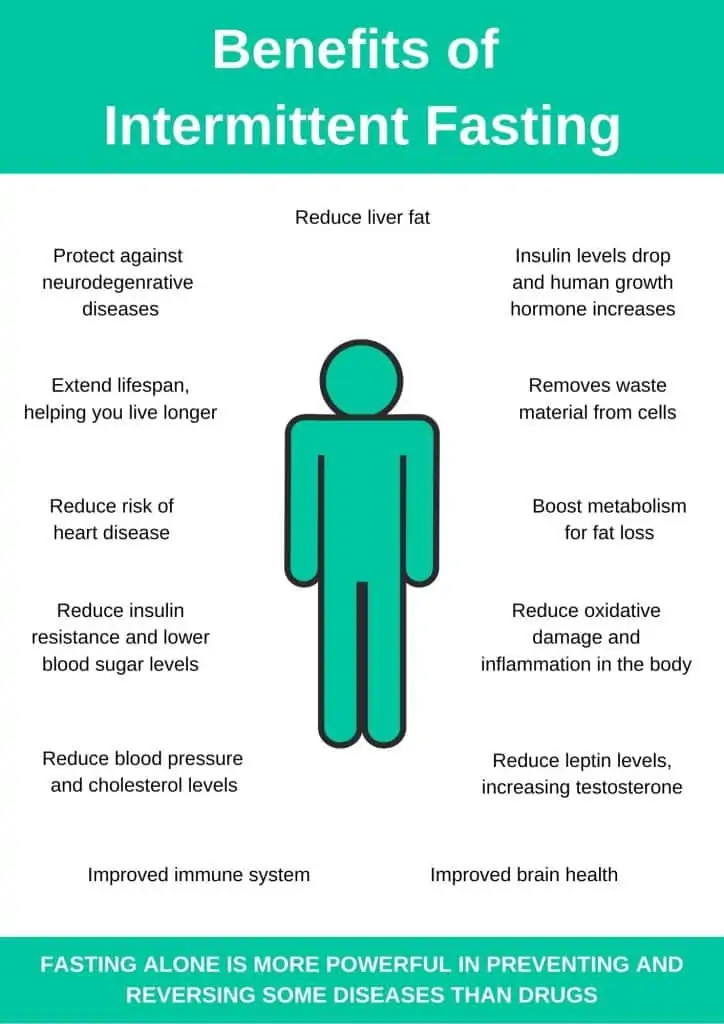
Window eating
- You eat meals at a particular window of time each day
The time frame can be anything depending on the person – 8 hours or 6-12 hours a day. You can also reduce the window time such as 3+ meals to 1 meal over several hours in a day, followed by fasting roughly between 18 to 22 hours every day.
Such purposeful timing of your meals gives enough time for your body to exhaust its levels of glycogen and start producing ketones. To know the benefits of this practice, watch this video.
Hara Hachi Bu
- You stop eating food once you are 80% full.
This is another popular dietary practice of the people of Okinawa island in Japan. They have a long life-span and women are expected to live up to an average of 90 years old.
The benefits of Hara Hachi Bu eating practices are – lower cardiovascular risks, reduce diabetes, and weight loss.
Periodic fasting
- Caloric intake is restricted for consecutive days, such as 5 days in a row once a month, and unrestricted on all other days.
Alternate-day fasting
- Eating is unrestricted every other day, and no or minimal calories can be consumed on the days in between.
Dry fasting
- Also known as absolute fasting, where you don’t have food, water, broth, tea nothing.
This is an extreme form of eating practise that is into practise since agees. Although social media popularized intermittent fasting, a lot of social media influencers are stepping into dry fasting.
Ramadhan or Ramathan, is the ninth month of the Islamic calendar, observed by Muslims worldwide as a month of fasting, prayer, reflection and community. It involves dry fasting which is no food or liquid at all.
Scientific studies revealed that there are mind-blowing dry fasting benefits. For healthy people, dry fasting activates deep cellular cleansing and is more effective than any other body cleansing method.
This practice is not beneficial for those with heart diseases. Results depend on an individual’s body and life state.
There are different types of fasting and you know which ones make you feel better. So, notice how you feel and choose the best fasting practise for better outcomes.
If you are a beginner embarking on the journey of fasting, go slow!
Read Intermittent Fasting For Weight Loss: Does It Actually Work?
Start with a 12 to 24 hour fast and see the changes in your body. If you are fine with it, you can fast for one day a week. Hunger pains and mood swings are common in the beginning, eventually you will feel better. You will realise that fear of weakness and mood shifts during fasting stem from our mentality and not our physicality.
How fasting affects root chakra?
We all have different sorts of fears in our lives. Fear of survival is profound, especially when it comes to fasting. A lot of people fear that fasting depletes energy. Some have the innate belief that not consuming 2000 calories in a day may make them weak and sick.
Read Symptoms Of Blocked Chakras: How To Identify and Heal
Such fears block their body’s root chakra (responsible for feelings of groundedness and well-being), which is linked to financial independence, money, and food. The side effects of block in root chakra are – feelings of burnout, fatigue, or a lack of motivation. Thus, fears prevent people from understanding the full potential of their body and reaping the scientific benefits associated with fasting.
We must believe that our body is capable of fasting and repairing any damage at cellular level (in case). With such faith in your body’s inherent healing power, you will become stronger physically and mentally.
So, next time, the fear of fasting haunts you, take a few deep breaths, meditate and remember that your body is stronger than you think.
Fasting with a positive attitude and belief will lift your life state and boost your physical body to perform at the next level. Having the right food in the right amount and living with optimism will unblock the root chakra.
References
- Tucker, T., 2007. The great starvation experiment: Ancel Keys and the men who starved for science. U of Minnesota Press.
- Scholtens, E.L., Krebs, J.D., Corley, B.T. and Hall, R.M., 2020. Intermittent fasting 5: 2 diet: What is the macronutrient and micronutrient intake and composition?. Clinical Nutrition, 39(11), pp.3354-3360.
- Coutinho, L. and Nuaimi, S.A.A., 2020. The Dry Fasting Miracle: From Deprive to Thrive. Penguin Random House India Private Limited.Korbonits, M., Goldstone, A.P., Gueorguiev, M. and Grossman, A.B., 2004. Ghrelin—a hormone with multiple functions. Frontiers in neuroendocrinology, 25(1), pp.27-68.
- Inagaki, T., Lin, V.Y., Goetz, R., Mohammadi, M., Mangelsdorf, D.J. and Kliewer, S.A., 2008. Inhibition of growth hormone signaling by the fasting-induced hormone FGF21. Cell metabolism, 8(1), pp.77-83.
- Moore, J. and Fung, J., 2016. The complete guide to fasting: Heal your body through intermittent, alternate-day, and extended fasting. Simon and Schuster.
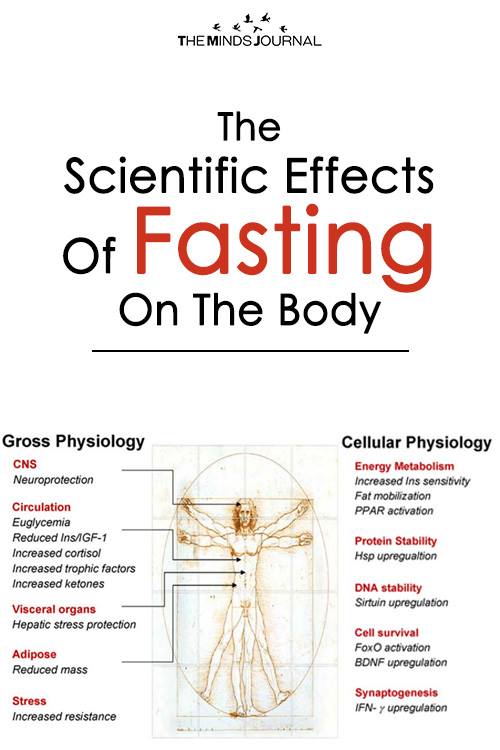
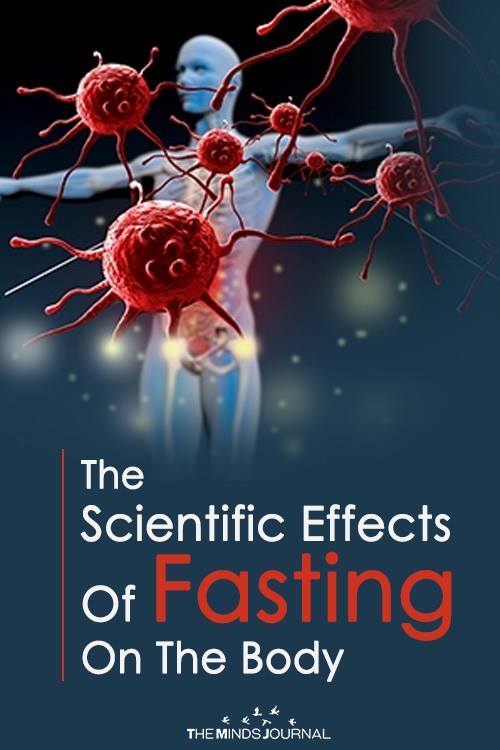
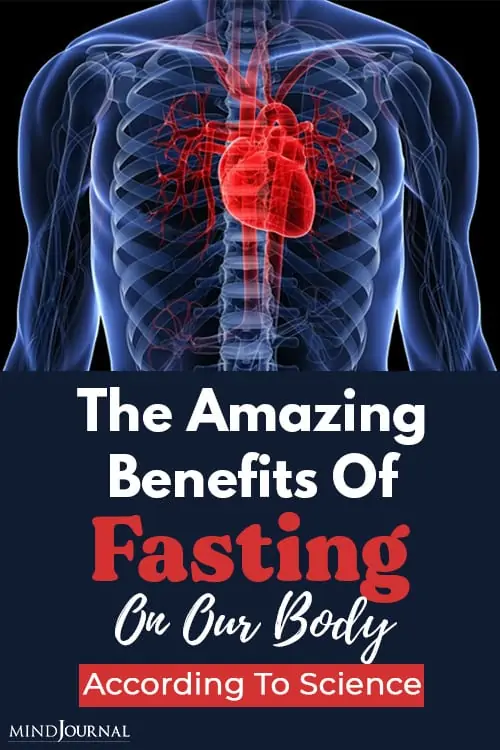
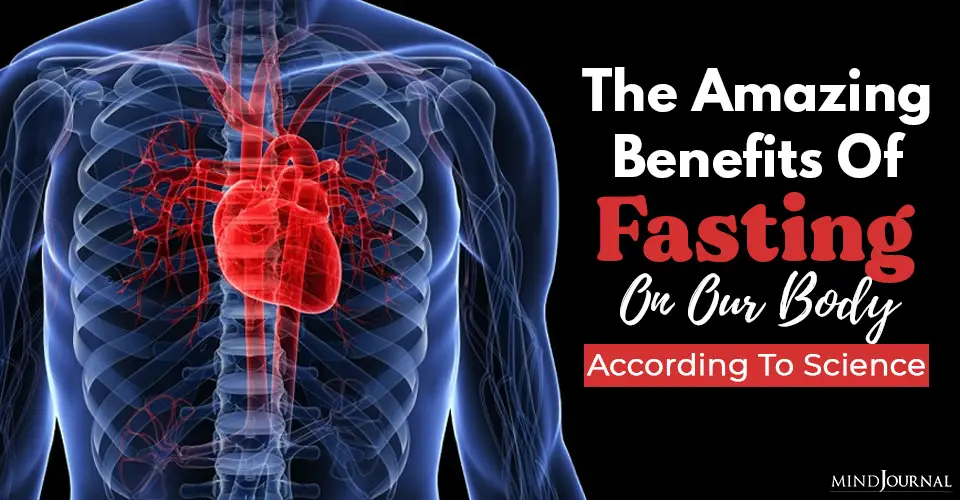






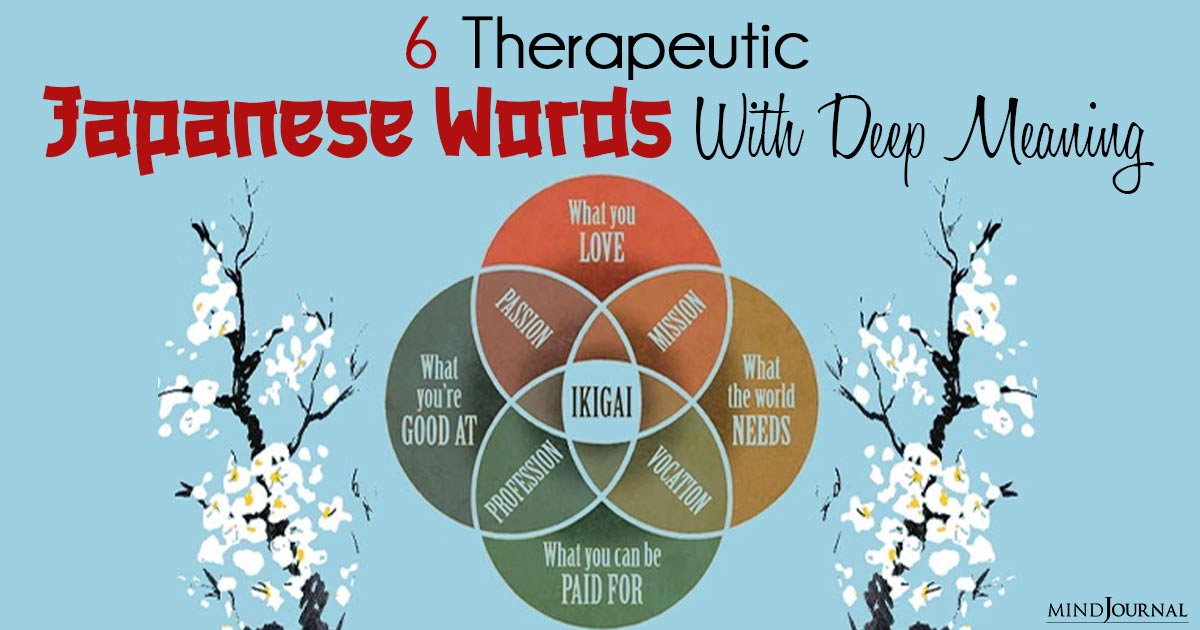
Leave a Reply
You must be logged in to post a comment.